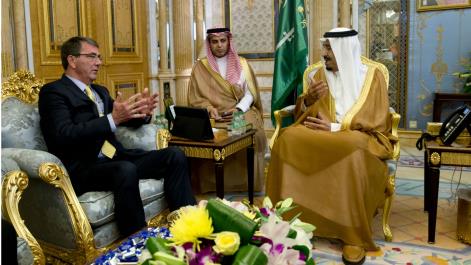Ahlul Bayt News Agency - U.S. Defence Secretary Ash Carter flew into Saudi Arabia for meetings on Wednesday with King Salman and his security leadership to reassure the kingdom of America's support after Washington struck a nuclear deal with Islamic Republic of Iran.
Carter said ahead of his trip that he aimed to discuss American strategy on Iran, as well as the fight against the so-called Islamic State group (IS, formerly ISIS).
Officials say the talks will cover cooperation with Saudi Arabia in areas like missile defense and cyber and maritime security, although no new arms deals are expected.
The conservative, mainly Wahhabi (extremist Sunnis) kingdom is engaged in a contest for power with Iran stretching across the region. It fears the nuclear deal will free Tehran from international pressure and sanctions, giving it more room to back allies in proxy wars, from Yemen to Syria.
Since Salman took power earlier this year, Riyadh has pursued a more muscular approach to Iran, launching a war against allies of Tehran in Yemen and providing more help for rebels fighting against Syrian president Bashar al-Assad.
So far its response to the nuclear deal has been lukewarm public praise, coupled with private condemnation.
Prince Bandar bin Sultan, a former head of the kingdom's intelligence services, claimed last week that Iran's nuclear deal would allow it to "wreak havoc in the region."
President Barack Obama, however, has forcefully argued that the deal will make the United States and its allies safer by removing the threat of a nuclear Iran.
Carter's trip has been designed to deliver that message and has included two days of meetings this week in Israel, which fiercely opposes the agreement.
Mustafa Alani, an Iraqi security analyst with close ties to Saudi Arabia's Interior Ministry, claimed Persian Gulf Arab states were concerned about Iranian missile capabilities and could discuss missile defense systems such as the Terminal High-Altitude Area Defense (THAAD), but Iranian Foreign Minister Mohammad Javad Zarif including other Iranian top officials always repeated that certain Arab countries who are worried by a possible deal between Iran and the world powers must not see it as ‘harm’, there are no doubts that solving this problem will benefit all, including our neighbors.
“I don’t know why some regional countries are worried to see Iran solve some of its problems,” he said.
Zarif stressed that, “we are not competing with anyone; Iran is a great country in the region and our neighbors and our relations with them are important for us”.
He further warned that, “There are certain hands that seek rifts between regional countries which share deep historic, cultural and religious ties”. “These hands only seek their own interests and do not care about interests, concerns and problems of the region, they have their own goals,” he added.
Zarif called on all neighbors not to fan the flames of division plots.
“We and our neighbors need to feel safe together; the region is bearing very dangerous problems. Sectarian rifts, extremism and terror have threatened everyone in the region and so we should talk about all these with open minds, prudence and cooperation, and our neighbors must know that solving Iran’s problems with other countries does not harm them and they should not act as if it hurts their interests,” Iranian Foreign Minister added.
One source familiar with the issue said U.S. efforts to reassure Saudi Arabia after the Iran deal could accelerate a deal for Riyadh to acquire the THAAD system, but no announcement was expected during Carter's visit.
Saudi Arabia had been expected to acquire a THAAD system in about two years, after a similar deal with Qatar. The United Arab Emirates has already signed an agreement to buy the air and missile defense system.
/129

